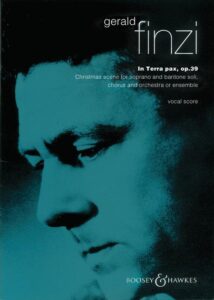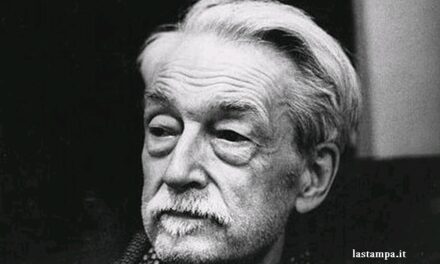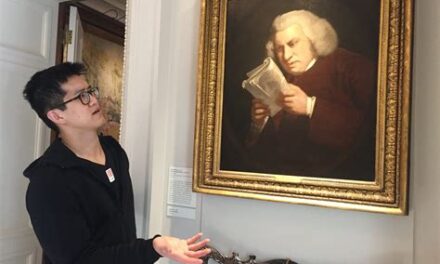Within the vast corpus of music for Advent and Christmas there is so much music more people should hear and know. I have been fortunate to hear some of this music during my six years of hosting ‘Church and Culture’ on the Ave Maria Radio Network. Each year I have invited people who know this repertoire to play and discuss this music. More often than not, they surprise me with selections I had never heard.
For example, on my latest Christmas music show, the British music critic Guy Rickards played Christmas pieces by Carl Nielsen, Bohuslav Martinu, Bela Bartok, and Luigi Dallapiccola, all completely new to me.
But I want to talk to you here about one piece of music which every year fills me with the sense of mystery of this season like none other I know.
‘In Terra Pax: Christmas Scene’ (Peace On Earth) was written in 1954 by the English composer Gerald Finzi (1901-1956). Approximately fifteen minutes long, it consists of two parts, “A Frosty Christmas Eve” and “Lo, the Angel of the Lord Came Upon Them.” The work features verses from ‘Noel, Christmas Eve, 1913’ by the poet Robert Robert Bridges which provide the context for the Christmas narrative in the Gospel of St. Luke. (A link to a performance of ‘In Terra Pax’ is at the bottom.)
The composer himself describes ‘In Terra Pax’ as “the Nativity becomes a vision seen by a wanderer on a dark and frosty Christmas Eve in our own familiar landscape’. Music scholar John Bawden comments, “this placing of the Biblical story into an English pastoral context is entirely consistent with Finzi’s close affinity with the English Romantic tradition, and his lifelong dedication to the creation of his own rural paradise at his home in Ashmansworth, near Newbury,” England.

The first part opens with a gentle three-minute orchestral prelude featuring harp, winds, and percussion announcing the melodic sung by the baritone when he enters singing the first lines of Bridge’s poem. As Bawden describes it, “In the opening section the poet is standing on a hill contemplating the events of the very first Christmas, the sound of the distant church bells becoming for him the sound of an angel choir. This image is expressed in a pealing-bells motif which, together with the refrain from ‘The First Nowell’, provides the musical fabric of the piece.” Here’s the first stanza:
A frosty Christmas eve
When the stars were shining
Fared I forth alone,
Where westward falls the hill
And from many a village
In the water’d valley,
Distant music reached me
Peals of bells aringing
The constellated sounds,
Ran sprinkling on earth’s floor
As the dark vault above,
With stars was spangled o’er.
The baritone’s voice rises steadily to an exclamation on the words, ‘As the dark vault above,’ evoking the miraculous event that lies ahead. Throughout his compositions, Finzi had a unique ability to write music that steers the ear towards the transcendent source of all creation. The baritone continues:
Then sped my thoughts to keep,
That first Christmas of all
When the shepherds watching
By their folds ere the dawn
Heard music in the fields
And marveling could not tell
Whether it were angels
Or the bright stars singing.
Finzi found great joy in the season, note the festive treatment of “and marveling could not tell / Whether it were angels.” Finzi was known for the pleasure he took in his long walks in the countryside and in reading his beloved books of poetry, despite experiencing much tragedy in his life. World War I was being fought during his early teen years. His father, three elder brothers, and his music teachers were all killed by the time he was eighteen. And he was fifty when he found out about the leukemia which killed him six years later.
At the end of the first part, the chorus quietly enters singing the verses from St. Luke’s gospel following by an orchestral interlude led by the cellos:
And there were in the same country shepherds abiding in the field,
keeping watch over their flock by night.
The second part begins with a startling change of mood, the cymbals lead to a rousing chorus singing the next verses of St. Luke’s account of the Christmas Story.
And, lo, the angel of the Lord came upon them,
and the glory of the Lord shone round about them:
and they were sore afraid.
For the first time a tone of cautious dissonance is used at “and they were sore afraid.” But the mood switches quickly again back to one of serenity changes with the chorus intoning, “And the angel said unto them.”
Then a soprano as the voice of an angel sings with great beauty the good news:
Fear not: for, behold, I bring you good tidings of great joy,
which shall be to all people. For unto you is born this day in
the city of David a Saviour, which is Christ the Lord. And this
shall be a sign unto you; Ye shall find the babe wrapped in
swaddling clothes, lying in a manger.
The chorus enters repeating repeating the lines, “then suddenly” and continues:
there was with the angel a multitude of the heavenly host praising God, and saying:
Glory to God in the highest and on earth peace, good will toward men.
The tolling of bells effect Finzi uses with the words, ‘Glory to God,’ is remarkable but also connects to some of the first lines sung: “Distant music reached me / Peals of bells aringing.” The angel’s theme returns in the orchestra, but the baritone’s voice enters singing with haunting reverence:
But to me heard afar
It was starry music.
Angels’ song, comforting
As the comfort of Christ
When He spake tenderly,
To His sorrowful flock:
The old words came to me,
By the riches of time
Mellow’d and transfigured,
As I stood on the hill
Heark’ning in the aspect
Of th’ eternal silence.
The orchestra repeats the two central themes of the piece and fades away. Critic John Bawden describes the effect of In Terra Pax better than anyone when he says:
“In Terra Pax is a radiant, optimistic work of great beauty and sincerity; a miniature masterpiece that unites emotions, images and the familiar events of the Christmas story into a compelling musical narrative that is at once personal yet universal.”
I recommend listening to this performance conducted by Hilary Davan Wetton with the Bournemouth Symphony Orchestra, City of London Choir, with baritone Roderick Williams and soprano Julia Doyle.














